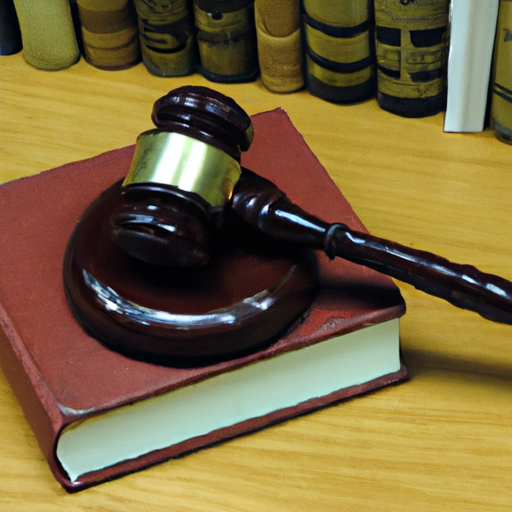In need of professional guidance and legal expertise for your intellectual property matters in Smithfield, Utah? Look no further than the dedicated and highly experienced Intellectual Property Lawyer in Smithfield, Utah. With a deep understanding of the complex legal landscape surrounding intellectual property, this lawyer possesses the knowledge and skills necessary to protect and defend your valuable creations. From trademarks and patents to copyrights and trade secrets, this lawyer offers innovative solutions tailored to meet the unique needs of each client. With a focus on assisting businesses and business owners, this lawyer’s expertise can provide the strategic advantage needed to navigate the intricate world of intellectual property law. Contact the Intellectual Property Lawyer in Smithfield, Utah today to schedule your consultation and take the first step towards safeguarding your intellectual assets.

What is Intellectual Property Law?
Definition and Overview
Intellectual Property (IP) law refers to a branch of legal practice that deals with the protection of creations of the human mind. It is designed to safeguard the rights and interests of individuals or entities who have developed unique and original works. Intellectual property can include inventions, designs, trademarks, or works of art.
Types of Intellectual Property
There are various types of intellectual property protected under IP law:
-
Trademarks: These are distinctive signs used to identify products or services and differentiate them from others in the market.
-
Copyrights: These protect original works of authorship, such as literary, artistic, musical, or dramatic creations.
-
Patents: Patents grant exclusive rights to inventors to protect their inventions from being used, made, or sold by others.
-
Trade Secrets: These comprise valuable and confidential information that provides a competitive advantage to businesses.
Importance of Intellectual Property Law
Intellectual property plays a crucial role in promoting innovation, creativity, and economic growth. IP law ensures that innovators and creators are incentivized to invest time, effort, and resources into developing new ideas and works. It grants them exclusive rights over their creations, enabling them to monetize their intellectual assets and maintain a competitive edge in the marketplace. Intellectual property law also encourages the sharing of knowledge and technology through licensing agreements and collaborations, contributing to the overall advancement of society.
Why Hire an Intellectual Property Lawyer?
Expertise in Intellectual Property Law
Navigating the complexities of intellectual property law requires specialized knowledge and expertise. An intellectual property lawyer possesses in-depth understanding of the legal framework governing patents, trademarks, copyrights, and trade secrets. They stay updated with the latest legal developments, ensuring that their clients’ intellectual property rights are protected and enforced effectively.
Protection of Intellectual Property
One of the primary roles of an intellectual property lawyer is to assist clients in safeguarding their intellectual assets. They can help individuals or businesses identify and classify their intellectual property, conduct comprehensive searches to ensure the rights are not infringed upon, and develop strategies to protect the creations from unauthorized use or exploitation.
Enforcement of Intellectual Property Rights
In the event of intellectual property infringement, an intellectual property lawyer plays a crucial role in enforcing the rights of the owner. They can take legal action against infringers, seek injunctive relief to prevent further unauthorized use, and pursue damages to compensate for the harm caused. Intellectual property lawyers have the experience and acumen to handle litigation, negotiations, and alternative dispute resolution methods to effectively resolve IP-related conflicts.
Services Offered by an Intellectual Property Lawyer
Trademark Registration and Protection
An intellectual property lawyer can guide clients through the trademark registration process, ensuring compliance with legal requirements and maximizing the chances of a successful application. They conduct thorough searches to ensure the availability of the desired trademark, handle the drafting and submission of registration documents, and assist with the prosecution of trademark infringement cases.
Copyright Registration and Protection
Intellectual property lawyers help individuals register their copyrights, offering protection for original works against unauthorized copying, distribution, or reproduction. They assist in navigating the copyright registration process, provide advice on fair use and licensing, and represent clients in copyright infringement cases.
Patent Application and Prosecution
For inventors seeking to protect their inventions, an intellectual property lawyer can assist with patent applications and guide them through the complex process. They understand the intricacies of patent law, conduct prior art searches to determine patentability, draft patent claims, and handle patent prosecution with the United States Patent and Trademark Office (USPTO).
Trade Secret Protection
Intellectual property lawyers advise clients on strategies to protect their valuable trade secrets. They help establish internal policies and agreements to maintain confidentiality and prevent misappropriation. In the event of trade secret theft or disclosure, they take legal action to safeguard their clients’ interests.
Licensing and Contracts
An intellectual property lawyer helps negotiate and draft licensing agreements, ensuring that clients’ intellectual property rights are properly protected. They provide guidance on licensing terms, royalties, and enforcement mechanisms to avoid disputes and maximize the commercial potential of intellectual assets. These lawyers also review and advise on various contracts related to intellectual property, such as confidentiality agreements, non-disclosure agreements, and joint development agreements.
Intellectual Property Litigation
In cases where intellectual property rights are infringed or disputed, an intellectual property lawyer can represent clients in litigation. They develop strong legal strategies, gather evidence, and present arguments in court to protect their clients’ intellectual property interests. Intellectual property litigators are skilled in negotiation and alternative dispute resolution methods, seeking favorable settlements whenever possible.
Understanding Trademarks
Definition and Purpose
A trademark is a recognizable sign, symbol, or expression that distinguishes products or services from those of others. Its primary purpose is to help consumers identify and associate products or services with a particular source or brand. Trademarks can be in the form of words, logos, slogans, sounds, or even scents.
Trademark Registration Process
Trademark registration involves various steps to ensure legal protection. An intellectual property lawyer can guide clients through the process, which includes conducting a trademark search to ensure availability, submitting a trademark application to the USPTO, and responding to any objections or office actions.
Benefits of Trademark Registration
Registering a trademark provides several benefits, including:
-
Exclusive Rights: Trademark registration grants the owner exclusive rights to use the mark in connection with the registered goods or services.
-
Nationwide Protection: Once registered, the trademark is protected throughout the United States, allowing the owner to prevent others from using a similar mark in related industries.
-
Legal Presumption: Registration creates a legal presumption of the trademark’s validity and the owner’s exclusive rights, making it easier to enforce against infringers.
-
Damages and Remedies: Registered trademark owners are eligible for statutory damages and attorney’s fees in infringement cases, providing a stronger deterrent against unauthorized use.
Trademark Infringement and Enforcement
In cases of trademark infringement, an intellectual property lawyer can help protect the owner’s rights. They analyze the alleged infringement, gather evidence, and take appropriate legal action, such as sending cease and desist letters, negotiating settlements, or filing lawsuits to obtain injunctions and seek damages.
Copyright Protection and Registration
What is Copyright?
Copyright is a form of intellectual property protection that safeguards original works of authorship, such as literary, artistic, musical, or dramatic works. It provides the creator exclusive rights over their creations, including the right to reproduce, distribute, display, perform, and create derivative works based on the original.
Copyright Registration Process
While copyright protection exists automatically upon the creation of a work, registration with the U.S. Copyright Office offers additional benefits. An intellectual property lawyer can assist with the registration process, which involves completing the necessary application forms, submitting the required materials, and navigating any potential challenges or disputes.
Copyright Ownership and Duration
Copyright ownership generally rests with the creator of the work. However, in cases where work is created as part of employment or under a contractual agreement, ownership may belong to the employer or the contracting party. Copyright lasts for the life of the author plus 70 years after their death.
Copyright Infringement and Remedies
An intellectual property lawyer can help copyright owners enforce their rights in cases of infringement. They evaluate the similarities between the original work and the alleged infringing material, advise on the strength of the claim, and pursue legal action to stop the infringement and seek appropriate remedies such as damages or injunctions.
The Importance of Patents
Overview of Patents
Patents are legal protections granted to inventors for their new inventions or significant improvements to existing inventions. They provide exclusive rights to the inventor, preventing others from making, using, selling, or importing the patented invention without permission. Patents encourage innovation by allowing inventors to profit from their creations.
Patent Application Process
Obtaining a patent involves a complex and rigorous application process. An intellectual property lawyer can assist inventors in drafting and preparing a patent application, which includes detailed descriptions, drawings, and claims. They navigate the procedures set by the USPTO, respond to any examiner objections, and advocate for the inventor’s rights throughout the process.
Types of Patents
There are three main types of patents:
-
Utility Patents: These protect new processes, machines, articles of manufacture, compositions of matter, or improvements thereof.
-
Design Patents: Design patents safeguard new, original, and ornamental designs for an article of manufacture.
-
Plant Patents: Plant patents protect new, asexually reproduced plant varieties.
Patent Infringement and Defense
If someone uses, manufactures, or sells an invention without the patent owner’s permission, it constitutes patent infringement. An intellectual property lawyer can help patent holders enforce their rights by initiating legal action against infringers. Conversely, they can also provide legal defense to those accused of patent infringement, ensuring their rights are protected and defending against unjust claims.

Securing Trade Secrets
What are Trade Secrets?
Trade secrets encompass valuable and confidential information that provides businesses with a competitive advantage. This can include formulas, recipes, manufacturing processes, customer lists, marketing strategies, or any proprietary information that gives a business its unique edge in the market. Unlike patents, trademarks, or copyrights, trade secrets are protected through secrecy rather than registration.
Trade Secret Protection Strategies
An intellectual property lawyer can help businesses establish strategies to protect their trade secrets. This includes implementing internal policies and agreements, such as non-disclosure agreements and employment contracts, to maintain confidentiality. They can also advise on security measures, technology solutions, and best practices to prevent misappropriation or unauthorized disclosure.
Trade Secret Misappropriation
In cases where a trade secret is stolen, misappropriated, or disclosed without authorization, an intellectual property lawyer can represent businesses in legal proceedings. They investigate the extent of the misappropriation, gather evidence, and pursue legal action to stop the unauthorized use and seek damages for the harm caused.
Intellectual Property Licensing and Contracts
Negotiating and Drafting Licensing Agreements
Intellectual property lawyers assist clients in negotiating and drafting licensing agreements, enabling individuals or businesses to license their intellectual property to others for various purposes. These agreements define the terms and conditions of the license, including the scope, duration, royalties, and restrictions. A well-drafted licensing agreement protects the interests of the licensor and ensures compliance with intellectual property laws.
Reviewing and Advising on Contracts
Aside from licensing agreements, intellectual property lawyers review and advise clients on various contracts related to intellectual property. This includes reviewing and drafting confidentiality agreements, assignments, joint development agreements, manufacturing agreements, and distribution agreements. They ensure that these agreements accurately reflect the parties’ intentions and adequately protect their interests.
Enforcing Licensing Agreements
In cases where a licensing agreement is breached or violated, an intellectual property lawyer helps the aggrieved party enforce the terms of the agreement. They can engage in negotiations, mediations, or represent their clients in legal proceedings, seeking remedies such as injunctive relief, damages, or termination of the agreement.

Intellectual Property Litigation
When to Pursue Litigation
Intellectual property litigation may be necessary when efforts to resolve disputes through negotiation or alternative dispute resolution methods fail. An intellectual property lawyer can assess the strength of the case, advise on potential outcomes, and help clients make informed decisions on whether to pursue litigation to protect their rights and seek appropriate remedies.
Preparing and Filing Lawsuits
In preparation for litigation, an intellectual property lawyer conducts comprehensive research, gathers evidence, and formulates legal strategies. They draft and file lawsuits, ensuring compliance with procedural requirements and deadlines. Throughout the litigation process, they advocate for their clients’ interests, present arguments in court, and navigate the complexities of intellectual property law.
Defending Against IP Infringement Claims
In cases where clients are accused of intellectual property infringement, an intellectual property lawyer provides a strong defense. They evaluate the merits of the claim, gather evidence, and develop effective strategies to counter the allegations. By challenging the validity of the claims or establishing a valid defense, they protect their clients’ rights and minimize potential liabilities.
Alternative Dispute Resolution
Intellectual property lawyers also assist clients in resolving disputes through alternative dispute resolution methods, such as mediation or arbitration. These methods provide a less adversarial and more cost-effective approach to resolving conflicts while still protecting the clients’ intellectual property rights. Intellectual property lawyers can navigate these processes, negotiate favorable settlements, and ensure the clients’ interests are protected.
FAQs about Intellectual Property Law
What is the difference between a trademark and a copyright?
Trademarks protect brand names, logos, and symbols used to identify products or services, whereas copyrights protect original works of authorship, such as literary, artistic, or musical creations.
How long does copyright protection last?
Copyright protection typically lasts for the life of the author plus 70 years after their death. However, in the case of works made for hire or anonymous works, copyright lasts for 95 years from the date of publication or 120 years from the date of creation, whichever is shorter.
Can I trademark a slogan or a logo?
Yes, slogans or logos can be trademarked if they are distinctive and capable of identifying and distinguishing your goods or services from others in the marketplace.
What happens if my patent application is rejected?
If your patent application is rejected, an intellectual property lawyer can help assess the reasons for the rejection, consider potential amendments or arguments, and assist with filing appeals or pursuing further actions to overcome the rejection.
What should I do if someone is infringing on my intellectual property rights?
If you believe someone is infringing on your intellectual property rights, it is crucial to consult with an intellectual property lawyer as soon as possible. They can evaluate the situation, gather evidence, and advise on the appropriate legal actions to enforce your rights and seek remedies for the infringement.
Remember, these FAQs provide general information and should not be considered legal advice. Consulting with an intellectual property lawyer is essential for personalized guidance tailored to your specific circumstances.
In conclusion, intellectual property law is vital for protecting and enforcing the rights of creators and innovators. Hiring an intellectual property lawyer offers expertise in navigating this complex legal landscape, safeguarding intellectual assets, and advocating for clients’ interests in matters of trademark, copyright, patents, trade secrets, licensing, and litigation. By consulting with an intellectual property lawyer, individuals and businesses can secure their intellectual property rights, maximize their commercial potential, and mitigate the risks associated with infringement. Remember to contact our intellectual property lawyer in Smithfield, Utah, for a consultation and personalized guidance for your unique intellectual property needs.



